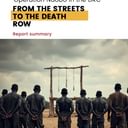
Women face “widespread discriminatory practices in the capital prosecution and detention” in death-penalty countries around the world, according to a new report by the Cornell Center on the Death Penalty Worldwide and the World Coalition Against the Death Penalty. The report, Judged for More Than Her Crime: A Global Overview of Women Facing the Death Penalty—released at the United Nations in Geneva, Switzerland on September 18, 2018 — examines the use of capital punishment against women worldwide, including the crimes for which women are sentenced to death and the conditions of imprisonment they face on death row.
At least 500 women are on death rows around the world, and the report estimates that more than 100 women have been executed in the last decade. The cases in which women are sentenced to death, the report states, are “emblematic of systemic failings in the application of capital punishment,” with death sentences often imposed on women who are illiterate, mentally ill, intellectually disabled, or members of marginalized ethnic groups.
The report finds that women’s histories of gender-based violence are frequently ignored by attorneys and judges in those countries that retain the death penalty. In a statement accompanying release of the report, the Cornell Center wrote, “[f]emale survivors of domestic abuse are particularly vulnerable to unfair sentencing practices.”
While the report notes that gender bias can operate in favor of more lenient sentencing for some women, that same gender bias results in harsher treatment of women who are seen as violating gender expectations. “[W]omen facing the death penalty have been cast as the ‘femme fatale,’ the ‘child murderer,’ or the ‘witch,’” the report says. In the foreword to the report, Agnes Callamard, the UN Special Rapporteur on Extrajudicial, Summary, or Arbitrary Executions, writes that “[c]riminal justice processes, largely designed by and for men, frequently are not only blind to the causes and consequences of gender-based violence, they may actively reinforce gender-based discrimination.” The report, she says, “reveals that courts judge women not just for their alleged offenses, but also for what are perceived to be their moral failings as women: as ‘disloyal’ wives, ‘uncaring’ mothers, ‘ungrateful’ daughters. Nowhere are transgressions of the social norms of gender behavior punished more severely than in a capital trial.”
The report also documents how women are uniquely affected by the harsh conditions on death rows around the world. In some countries, they must care for their infants or young children while shackled by the hands and feet. Female prisoners in Thailand and Myanmar have reportedly given birth alone in prison. Menstruating women are given little or no access to sanitary pads or other necessary products.
Sandra Babcock, Faculty Director of the Cornell Center on the Death Penalty Worldwide, said: “Hundreds of women have been unjustly sentenced to death around the world, yet their cases have been neglected by activists, scholars, and the international community. We hope that this report will draw attention to their plight and inspire courts and policymakers to modify their sentencing practices.”
Judged for More Than Her Crime: A Global Overview of Women Facing the Death Penalty, Cornell Center on the Death Penalty Worldwide and World Coalition Against the Death Penalty, September 2018; Press Release, New Cornell Study Documents Injustice and Discrimination Against Women Facing the Death Penalty Around the World, Cornell Center on the Death Penalty Worldwide, September 18, 2018.


